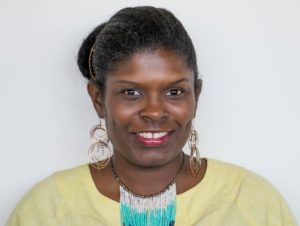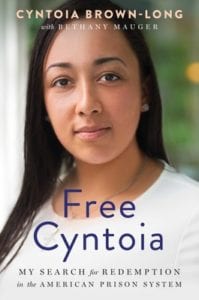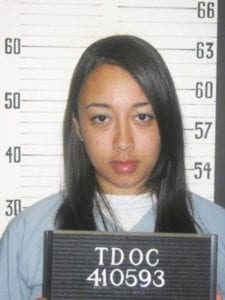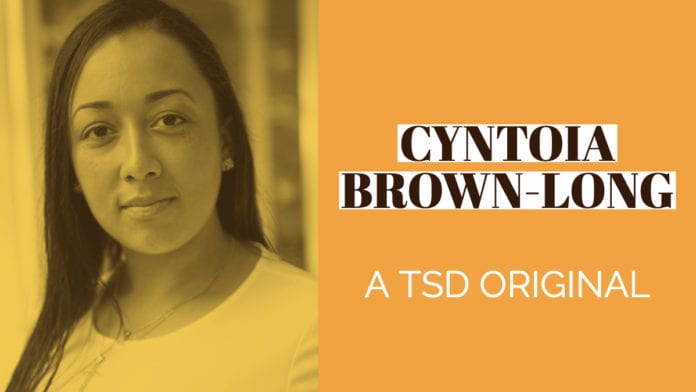
Cyntoia Brown’s story sent waves of nausea across my stomach and a riptide of ire through my mind. The ham-fisted “morality” and the way in which “justice” was meted out did not sit right in my spirit.
Where was the compassion? Where were the courtroom hugs and Bible? Where was the forgiveness that is often required of us? Do you mean to tell me there’s more compassion for a serial predator and frequent flyer with prostitutes than for this girl-child?
Last week, in advance of the Oct. 15 release of her memoir: “Free Cyntoia (My Search for Redemption in the American Prison System),” I interviewed her for my TSD column #Access901. There was so much running through my mind as I read the book in preparation for our conversation. A few takeaways and most salient points (without spoilers):
- My own foolish young girl behavior.
- The simultaneous invisibility and sexualization of young black and brown girls and resulting normalization of this.
- She was spiraling for some time but the big fall happened in a matter of weeks.
- Who’s to blame? Where was the fail?
- How remarkable this woman is!
 Who doesn’t want to be grown, especially as a teenager? I know I did. I pushed boundaries. But I quickly realized I was NOT ready for grown up stuff. When the grown stuff came at me around age 15, I said to myself, “Oh. This? NOPE.”
Who doesn’t want to be grown, especially as a teenager? I know I did. I pushed boundaries. But I quickly realized I was NOT ready for grown up stuff. When the grown stuff came at me around age 15, I said to myself, “Oh. This? NOPE.”
But I also remember wanting to be loved by someone, not to fill a void or resolve daddy issues. I just wanted to feel beautiful, special and adored like the girls in the movies. Cyntoia was no different than me or most of us. She just had the follow through and boldness I didn’t!
As with many teenagers, she was seeking freedom, belonging and acceptance, which she found in the streets. Although at home she was loved, accepted and never isolated. From most angles, it looked as if she had a good life. Most girls (or boys) that are drawn to the streets do so because there’s something lacking in their family life; not so much here.
So, what made her feel so disenchanted and at times angry?
In its simplest form, it was challenges with her identity and her otherness.
“I struggled with feeling different, feeling like an outcast….Now, we’ve done more to make people feel like it’s OK to be different. We’ve done more for inclusiveness,” she told me. “I was feeling like I didn’t belong where I was. And I just didn’t know what to do with those feelings.”
One thing is crystal clear. There was this dichotomy of being a girl in a woman’s body. This woman-child was doing grown stuff with her body but still thinking like a child. She believed in fairytales in the midst of this madness; Prince Charming will save the day.
Cyntoia was 16 when she had the fateful encounter that ended with her killing a man she said picked her up for a paid sexual encounter.
Of course her logic was faulty. Sometimes the stranger-danger alert kicked in, other times it didn’t; and other times it did but she walked right into danger anyway. How did she distinguish one situation from another? What made her decide that this bad thing/person wasn’t as bad as this other bad thing/person?
“I really didn’t do evaluations. There was no real risk assessment,” she said.
“I was just walking into situations and pretty much just reacting as they happened. I was just blindly walking in…I didn’t think about the consequences…so it wasn’t always consistent. And (consequently) I ended up dealing with things no one else my age would be able to navigate.”
She continued: “I wanted all this freedom but when I was legally declared grown at the age of 16, I was like, whoa, ‘I’m really in over my head this time.’ You realize how wrong you were. You’re forced to be grown without understanding what it means to be adult or even be a woman. Having to face life as an adult, you realize what mom was saying. It’s difficult to grow up like that.”
A useful tool in healing, self-forgiveness and uncovering personal truths is writing to your younger self. What she would tell Young Cyntoia and young girls?
“Slow down. I remember saying, ‘This is it, this is life,’ without slowing down to think about, ‘Where am I going? What do I want to do?’ Take the time to stop and think through things? Who are you? What do you want to see happen?
“We don’t think through things at that age. Ask yourselves, ‘Who are you and who do you want to be? What do you see coming from this course of behavior?’”
As for “Young Cyntoia” specifically, “I would tell her, you don’t know half the things that you think you know,” she said.
“I thought I knew better than my mother and anyone else around me. You couldn’t tell me anything! I would tell (Young Cyntoia), ‘you have no idea what life is really about. You’re not equipped, you’re not ready…to be grown….God has it so you’re in your home with your parents for a reason…so you learn the ways of the world.’”
 Tried as an adult, she was convicted of first-degree murder and robbery. Tennessee law mandated that she not be eligible parole for at least 51 years. She was 31 when her sentence was commuted by then-Gov. Bill Haslam on Aug 7, 2019.
Tried as an adult, she was convicted of first-degree murder and robbery. Tennessee law mandated that she not be eligible parole for at least 51 years. She was 31 when her sentence was commuted by then-Gov. Bill Haslam on Aug 7, 2019.
Throughout the criminal court process, she continued to believe the criminal justice system would protect her and see her. Which raises the point of invisibility and sexualization of black and brown girls. This is a story in and unto itself, pegged to the larger community.
As a mother to a young daughter, I find this distressing. It’s not just white people, it’s us too. Invisibility is a twin demon of sexualizing children. Some people just don’t see their girlhood or their innocence. Somehow the lens through which people view our children is distorted. Since slavery, our bodies were never our own; they were up for grabs for whoever was interested. Clearly, there are remnants of this disposition today.
Without spoiling the book and going too deep into the weeds, I encourage people to just stop and see our girls. See their worth, even when they don’t. It’s doesn’t matter if she’s “fass” or womanish or “developed.” DOES. NOT. MATTER. It’s our job as adults to shepherd children through the growing up process in the healthiest way possible. Even when they aren’t our kids, it’s still our village!
When we hear of these stories, our instinct often is to immediately assign blame. In between expletives and invectives, I was seeking a target. Whose fault is this? How did this happen?
However, there is no blame assignation anywhere in this book, which is one of the the ways in which Cyntoia is absolutely remarkable. She doesn’t even seem to blame any of the predatory grown men who passed through her life.
How?
I think this is part of being “Free Cyntoia.” Letting go and letting God. Through all of the trama, she managed to reconnect spiritually. The entire book, her entire story is a testimony. BUT. GOD. Sometimes there isn’t anything else to say.
Cyntoia came through this 15-year battle not weary, not worn, not weak. Still, how do you reprogram emotionally and find forgiveness for the people who have inflicted this kind of pain and trauma? How do you shed that armor? I am confounded by how much strength, resolve and, yes, faith, it must take to be in this place of peace.
“The crazy thing is that I really didn’t have a difficult time shedding the armor,” she said. “When I got out, I was like, ‘OK, I’m free.’ … I didn’t have a hard time transitioning. It’s natural. God made us to be free individuals.”
Now she can move how she wants.
“Lights out would be at 9:30,” she recalled. “So now, sometimes I’ll be up until 3 o’clock in the morning!”
There’s a freedom in “just cause” too!
She credits her support system as a huge reason her transition was so seamless.
“My husband has been incredible. Support matters. I’m super blessed coming out into the situation that I did.” (She’s now Cyntoia Brown-Long, having married Christian hip hop artist Jamie Long while in prison.)
What’s next? She looks forward to working with young people, the legal community and generally being of service.
“Free Cyntoia” puts humanity at the forefront. Everyone has a story. It’s up to us to see that and see them.
(“Free Cyntoia: My Search For Redemption in the American Prison System” is available for purchase on all platforms. On Sunday (Oct. 20), she will be in Memphis at New Direction Christian Church. The 6 p.m. event is free.)
#ACCESS901 columnist Joy Doss advances her interview with Cyntoia Brown



